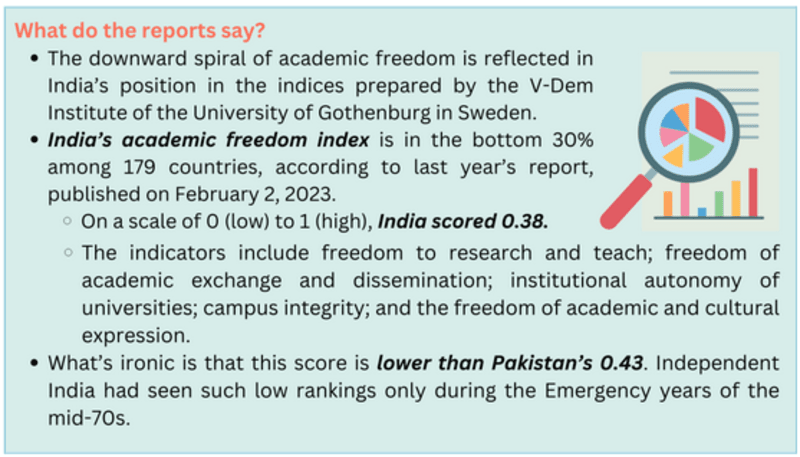The fading role of universities as conscience of society
Relevance: GS I and II (Social Issues and Justice)
- Prelims: UGC; University Grants Commission (UGC) Act of 1956;
- Mains: Education and Awareness; Grassroot Democracy;
Why in the News?
The recent moves of creating awareness about India’s achievements along various fields, in educational institutions are aimed at advancing the political agenda.

About:
- The University Grants Commission (UGC)’s directive to universities and colleges in the country to install the Union Government’s Beti Bachao Beti Padhao (BBBP) logo on their premises needs to be treated as another attempt to curtail academic freedom, which is already under siege.
- As a repeat of such directives (in a letter), the UGC, required the colleges to create selfie points featuring the Prime Minister.
- The aim of the selfie point, according to the letter, is to create awareness about India’s achievements in various fields, particularly the new initiatives under the National Education Policy 2020.
- Such diktats from the government have been sent to these institutes previously too. Earlier, they were asked to conduct activities such as generating awareness on G-20 meetings and Swachhatha campaigns.
What are the impacts of such moves?
Such moves are aimed at advancing the political agenda of the ruling regime through the universities would seriously dilute:
- Firstly, the academic institutes’ freedom and ability to follow their agenda of teaching and research that finally generates new ideas.
- For example, Indian Institute of Science (IISc) — the country’s top-ranking institute had to call off a discussion on the Unlawful Activities Prevention Act (UAPA), organised by its students and faculty, attempting to throttle academic freedom.
- Secondly, the concept of universities being vehicles of free thought would fall by the wayside.
- For example, the sanctity of academic freedom recently came into question when two important scholars resigned from their positions at Ashoka University following the publication of a paper that argued that the ruling party won a disproportionate share of seats in the 2019 Lok Sabha polls.
Challenging Dilemmas
Democratic functioning:
- Democracy cannot survive without dissenters and critical thinkers. An academic institute is a better platform to hold such discussions.
- Such discussions are crucial in a functioning democracy, regardless of anyone’s ideology or belief system. Placing restrictions on the articulation of one’s opinion or ideas can negatively impact academic work and hurt the research environment.
- Due to such performative chest-thumping on the Indian democracy there is the lack of concern for the freedom to conduct civic discourses that are vital for participatory democracy to thrive.
- During the emergency of the 1970s it was the first attempt to drag independent India towards homogenization and regimentation of thought.
- The fading academic freedom is also reflected in the gradual erosion of institutional autonomy, including the selection of Vice-Chancellors and heads of academic institutes.
Constitutional Provisions:
- In recent times, we have seen many such examples of the government intimidating scholars working in the knowledge sector into submission, either by intimidation or sending them to jail. Unlike in New Zealand, academic freedom is not mentioned in the Indian constitution; it is subsumed in the concept of the right to free speech as a part of the fundamental rights.
- A guaranteed principle in the Indian constitution, it is subject to reasonable restrictions emanating from the considerations of sovereignty, integrity, security, public order, and morality.
- The constitutional guarantee of freedom of speech is often hindered by the application of sedition law (Section 124A) or more commonly misused clauses under Section 295A – hurting religious feelings. Defamation lawsuits are now becoming tools of harassment against artists and academic scholars.
Other Criticism:
- According to some intellectuals, the UGC has seen a steady accretion of power and displayed a heightened propensity to function as an instrument of the ministry.
- The lack of academic autonomy is the bane that extends to the State level, too, and numerous instances of academic interference by the State governments have come to public attention.
- It has been observed that both at the Central and State government levels, to make university appointments on political considerations rather than merit.
- The poor leadership of universities thus developed works in tandem with the ruling parties to further their political interests, thus internally sabotaging the autonomy.
Way Forward:
- Need for a detailed analysis of academic freedom: Contracts with faculty should include a clause on the protection of academic freedom, i.e., they will not be penalized for extra-mural activities. Global institutions can help by including ‘Academic Freedom’ as one indicator in university rankings.
- Need to formulate system-wide protections: It is time that universities and higher education centers should formulate system-wide protections against restricting academic autonomy and freedom of expression.
- The Education Act legislated by the Government of New Zealand, defines the freedom of academic staff and students, within the law, to question and test received wisdom, to put forward new ideas and to state controversial or unpopular opinions.
- Need for behavioral change: The political parties, in the larger interest of the nation, must begin consultations with faculty bodies and students’ associations to change the current sorry state of academic freedom and autonomy in the country.
- It is time to remember that we are yet to realize Tagore’s vision of a nation, where the “mind is without fear”, as invoked in his soul-stirring poem, which was written when India was still a colony of the British.
|
BEYOND EDITORIAL The University Grants Commission (UGC) Act
Key aspects of the UGC Act include:
|


